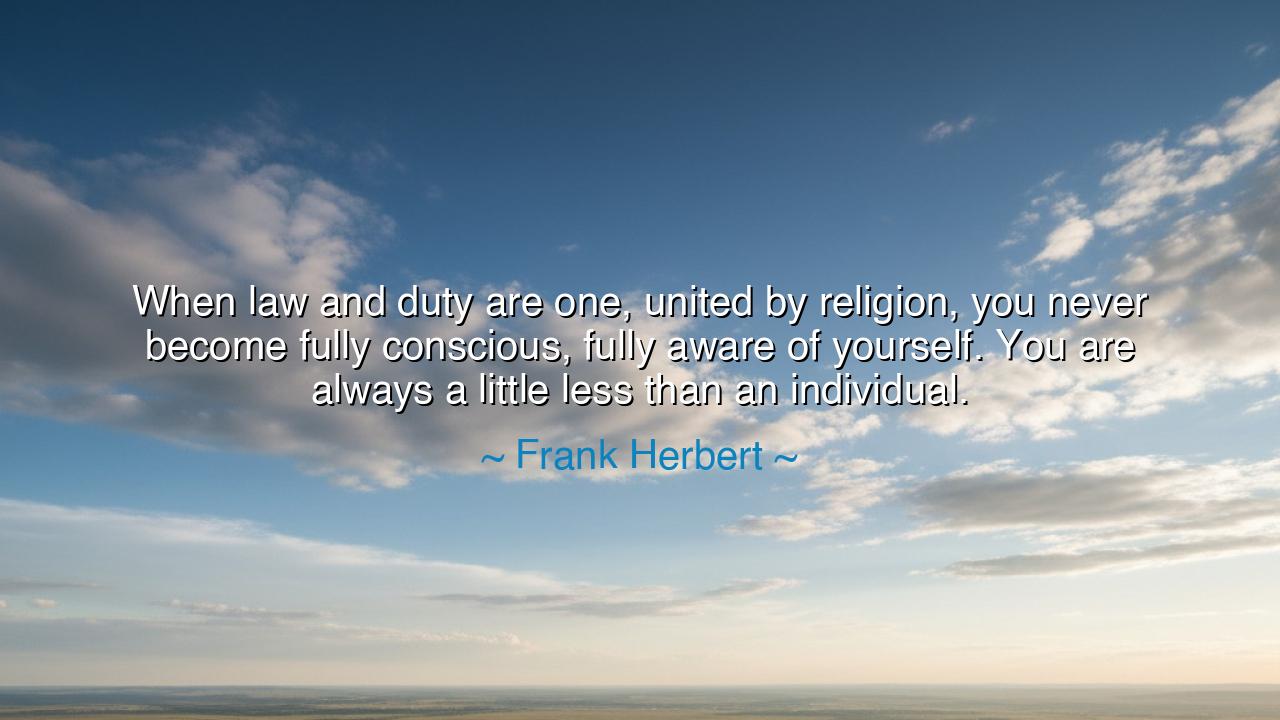
When law and duty are one, united by religion, you never become
When law and duty are one, united by religion, you never become fully conscious, fully aware of yourself. You are always a little less than an individual.






Frank Herbert, a sage of thought and imagination, spoke the words: "When law and duty are one, united by religion, you never become fully conscious, fully aware of yourself. You are always a little less than an individual." In these words, Herbert touches upon a profound truth: that the intertwining of law, duty, and religion can sometimes suppress the individual spirit, locking one in a collective identity that is regulated and guided by external forces. It is a powerful reflection on how the demands of society and spirituality, when fused together, can diminish the self-awareness and the autonomy of the individual.
To understand the depth of this, we must turn to the ancient teachings, where philosophers like Socrates and Plato warned of the dangers of a society too rigid in its structures. Socrates, the great Athenian philosopher, often spoke of the importance of the self—the inner self—which he believed should be the guide to one's actions and thoughts. When the law and duty are dictated by something outside the self—be it the state, the king, or divine command—the individual's ability to act according to their inner voice is weakened. The conscience is clouded, and the path to self-realization is obstructed by the dictates of the collective.
Consider the story of Socrates. He was a man who questioned the norms of his society, challenging the laws and the customs of ancient Greece, particularly the notion that the state or religion should hold supreme authority over the individual. Socrates knew that true wisdom came not from obedience to laws, but from understanding one's own mind and soul. It was his defiance of the Athenian law, which sentenced him to death for his beliefs, that illustrated his commitment to the individual over the collective. Through his actions, he showed that when one is bound by the collective demands of society, there is little room for self-expression and self-awareness.
Herbert’s insight resonates deeply with the teachings of Buddhism, which emphasizes the individual’s path to enlightenment—a path that must be walked alone, not dictated by external forces or rigid doctrines. The Buddha taught that true awareness comes when one frees oneself from the societal and religious chains that bind the mind. In Buddhism, duty and religion are not seen as burdens that suppress the individual; rather, they are guides for personal transformation. But when these are forced upon the individual from the outside, they can become tools of oppression, limiting the growth of the self.
In contrast, the great Roman philosopher Marcus Aurelius, who ruled an empire yet also sought inner peace, exemplified a balance between duty, law, and individuality. As emperor, his duties were immense, yet he maintained a deep sense of self-awareness through his practice of Stoicism. Stoicism teaches that one should live in harmony with the law of nature and society, but never at the cost of the individual’s inner freedom. Aurelius wrote in his meditations: "You have power over your mind, not outside events. Realize this, and you will find strength." His words reveal that while one may be bound by duty, the true power lies in the ability to remain conscious, to not lose oneself in the external forces of law and religion.
The lesson of Herbert’s words is one of profound self-awareness and autonomy. The individual, though part of a larger society governed by laws and moral duties, must never lose sight of their inner self. True freedom comes not in rebellion against society, but in understanding and integrating the world’s demands while remaining true to one’s inner essence. Religion and law, when they unite to serve the collective good, can be a force for harmony and order. But when they demand absolute conformity, they become chains, restricting the full potential of the individual.
Thus, to live fully as an individual, we must strive for a balance. Duty and law should not be blind commands, but should serve the growth of the individual, allowing them to think, feel, and act according to their inner truth. The wisdom of the ancients teaches us that the path of self-awareness lies not in total surrender to the external world, but in the ability to live harmoniously with it, while always remaining true to the individual self.






AAdministratorAdministrator
Welcome, honored guests. Please leave a comment, we will respond soon